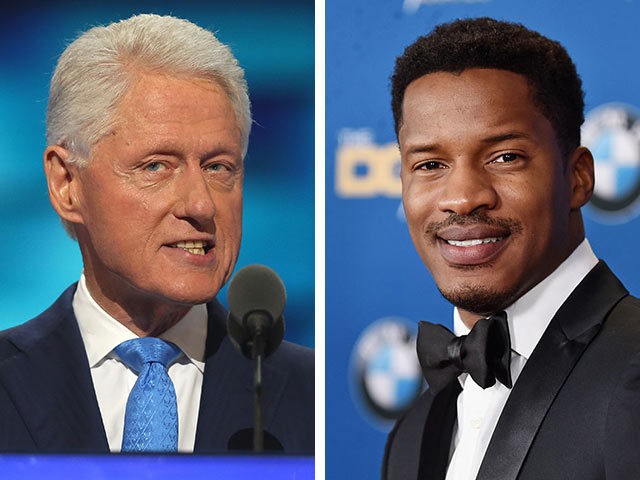Fox Searchlight may dramatically alter its promotional campaign for upcoming film The Birth of a Nation, because it fears that journalists will re-litigate a 17-year-old rape case where star-writer-director Nate Parker was acquitted of all charges.
At the same time, former President Bill Clinton has yet to face a question about the public resurfacing of one rape accuser, Juanita Broaddrick — even receiving excuses from a left-wing blogger who admits that she finds Broaddrick’s story credible.
Variety reports that the film studio might ditch a “roadshow” promotional tour with Parker precisely because the press will hound him on this old issue:
Despite the fact that Parker was acquitted of the rape charges in 2001, there are still concerns inside Fox Searchlight that the complicated issues raised by the case could overshadow a movie that was expected to be an Oscar front-runner. Parker’s co-writer on the film, Jean Celestin, was found guilty of sexually assaulting the same 18-year-old female, who claimed to be unconscious, after a night of drinking. Celestin appealed the verdict and was granted a new trial in 2005, but the case never made it back to court after the victim decided not to testify again.
According to sources, studio executives at Searchlight are assessing the fallout from a fresh round of stories about the incident on prominent news sites and African-American-targeted sites. The studio held a meeting on Monday morning with Parker’s team, and they are considering not granting new interviews with Parker from now until the movie debuts at the Toronto Film Festival in September. The hope is that by addressing the case well in advance of the movie’s festival run and October 7 debut, Parker can put it behind him by the time audiences get to see the movie.
Searchlight is also still trying to determine what the impact of the 1999 Penn State case will have on Parker as the face of the “The Birth of the Nation.” Part of the sales agreement for the film called for the label to support a roadshow that would have sent Parker around the country, to churches and college campuses, discussing issues of social justice. But each public appearance runs the risk of journalists or audience members reviving details of the court case and raising difficult questions.
Journalists, however, have not started such a feeding frenzy for the much more powerful, much more public, and much more white figure of Bill Clinton. In January of this year, Juanita Broaddrick bypassed the press and posted her allegation to Twitter. The post went viral, with over 47,000 retweets at the time of this writing.
I was 35 years old when Bill Clinton, Ark. Attorney General raped me and Hillary tried to silence me. I am now 73….it never goes away.
— Juanita Broaddrick (@atensnut) January 6, 2016
Since then, no journalist has directly asked Clinton about Broaddrick or her story. Not that Hillary Clinton’s presidential campaign has given them much opportunity — Bill has not given any one-on-one interviews since last fall, and neither he nor Hillary have held a press conference in 2016.
The establishment press and its defenders will likely object that Broaddrick’s allegations have received a fresh round of coverage, specifically from BuzzFeed’s Katie J.M. Baker this week. Yet this article is a wonderful example of “BenSmithing” — giving the establishment the excuse of having covered a story when asked why they are not pursuing a story. Baker’s interview with Broaddrick sheepishly accepts a “no comment” from Clinton spokesmen, depicts Broaddrick as a poor soul whose credibility has been undermined by right-wing partisans, and generates some negative headlines for Donald Trump. Now when readers demand a direct question to Bill Clinton, BuzzFeed and their NY-DC-LA Twitter buddies can link to Baker’s article and dismissively say, “We already covered that.”
Even more disturbingly, one reaction to Broaddrick’s recent resurgence says that Bill might be guilty and that’s okay with me. Rebecca Schoenkopf of Wonkette writes:
To sum up, I think Bill Clinton could very well have raped Juanita Broaddrick; that it doesn’t make him an evil man, or irredeemable (I’m Catholic; we’re all forgiven, if we’re sorry, and Broaddrick says Bill Clinton personally called her up to apologize). It doesn’t even necessarily make him a bad feminist — you know, later, once he stops doing that.
Let’s bring this back to Nate Parker. His big break as a filmmaker is under threat because he, as a twenty-year-old, poor, black college student, was accused of non-consensual sex. And despite being young, poor, and black, the justice system declared him innocent. Since then he has proclaimed faith in Christ, married, and become a father to five children. Yet journalists are not willing to let this story go.
On the other hand, Bill Clinton in 1978 was already powerful, serving as Arkansas’ Attorney General; politically connected; and white. He was never charged. Similar allegations of sexual assault continued to pop up for decades from many other women. He has never expressed remorse or admitted guilt — even in settling a sexual harassment lawsuit. And when he, as the most powerful man in the country, had an affair with a 21-year-old White House intern, he was impeached and eventually disbarred for lying under oath.
Yet journalists continue to ignore, downplay, or obfuscate his accusers’ charges.
Sex scandals mean big business for the news — which leads reporters to blow up old, long-resolved stories like Nate Parker’s into fresh controversies. However, there appears to be something magical about the last name “Clinton” that keeps them from pursuing these stories with anything close to their typical zeal.

COMMENTS
Please let us know if you're having issues with commenting.